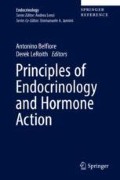Abstract
Broadly defined, endocrine diseases can be defined as disorders of (1) hormone deficiency, (2) hormone excess, (3) hormone resistance, (4) defects in transport proteins, and (5) benign or malignant tumors of the hormone-producing glands. These diseases can, in part, be caused by mutations in single genes (monogenic disorders), others result from the interaction of genetic predisposition and lifestyle factors (complex or multifactorial disorders), some are solely due to environmental factors (nutritional iodine deficiency), and several disorders are the result of a dysregulated immune system (autoimmune disorders). A detailed understanding of the underlying pathophysiology is of significant importance because it can provide means for an accurate diagnosis, therapy and intervention, and the development of novel therapeutic modalities.
References
Cabanillas ME, McFadden DG, Durante C. Thyroid cancer. Lancet. 2016;388(10061):2783–95.
Castro-Vega LJ, Lepoutre-Lussey C, Gimenez-Roqueplo AP, Favier J. Rethinking pheochromocytomas and paragangliomas from a genomic perspective. Oncogene. 2016;35(9):1080–9.
Collins FS, Varmus H. A new initiative on precision medicine. N Engl J Med. 2015;372(9):793–5.
Jameson J. Principles of endocrinology. In: Braunwald E, Fauci A, Kasper D, Hauser S, Longo D, Jameson J, editors. Harrison’s principles of internal medicine. 2. New York: McGraw-Hill; 2011. p. 2866–75.
Jameson J, Kopp P. Applications of molecular biology and genetics in endocrinology. In: DeGroot L, Jameson J, editors. Endocrinology. 1. 7th ed. Philadelphia: WB Saunders; 2015a. p. 41–67.
Jameson J, Kopp P. Principles of human genetics. In: Braunwald E, Fauci A, Kasper D, Hauser S, Longo D, Jameson J, editors. Harrison’s principles of internal medicine. 19th ed. New York: McGraw-Hill; 2015b. p. 425–45.
Kanaji N, Watanabe N, Kita N, Bandoh S, Tadokoro A, Ishii T, et al. Paraneoplastic syndromes associated with lung cancer. World J Clin Oncol. 2014;5(3):197–223.
Kronenberg H, Melmed S, Larsen P, Polonsky K. Principles of endocrinology. In: Melmed S, Polonsky K, Larsen P, Kronenberg H, editors. Williams textbook of endocrinology. 13th ed. Philadelphia: Elsevier; 2016. p. 2–11.
Mantovani G, Spada A, Elli FM. Pseudohypoparathyroidism and Gsalpha-cAMP-linked disorders: current view and open issues. Nat Rev Endocrinol. 2016;12(6):347–56.
Michels AW, Gottlieb PA. Autoimmune polyglandular syndromes. Nat Rev Endocrinol. 2010;6(5):270–7.
Mongan NP, Tadokoro-Cuccaro R, Bunch T, Hughes IA. Androgen insensitivity syndrome. Best Pract Res Clin Endocrinol Metab. 2015;29(4):569–80.
Pearce EN, Andersson M, Zimmermann MB. Global iodine nutrition: where do we stand in 2013? Thyroid. 2013;23(5):523–8.
Sluss P, Hayes F. Laboratory techniques for recognition of endocrine disorders. In: Melmed S, Polonsky K, Larsen P, Kronenberg H, editors. Williams textbook of endocrinology. 13th ed. Philadelphia: Elsevier; 2016. p. 77–107.
Spiegel AM. Hormone resistance caused by mutations in G proteins and G protein-coupled receptors. J Pediatr Endocrinol Metab. 1999;12(Suppl 1):303–9.
Stears A, O’Rahilly S, Semple RK, Savage DB. Metabolic insights from extreme human insulin resistance phenotypes. Best Pract Res Clin Endocrinol Metab. 2012;26(2):145–57.
Tomer Y. Mechanisms of autoimmune thyroid diseases: from genetics to epigenetics. Annu Rev Pathol. 2014;9:147–56.
Author information
Authors and Affiliations
Corresponding author
Editor information
Editors and Affiliations
Rights and permissions
Copyright information
© 2018 Springer International Publishing AG
About this entry
Cite this entry
Lowden, E., Kopp, P. (2018). Principles of Endocrine Diseases. In: Belfiore, A., LeRoith, D. (eds) Principles of Endocrinology and Hormone Action. Endocrinology. Springer, Cham. https://doi.org/10.1007/978-3-319-44675-2_28
Download citation
DOI: https://doi.org/10.1007/978-3-319-44675-2_28
Published:
Publisher Name: Springer, Cham
Print ISBN: 978-3-319-44674-5
Online ISBN: 978-3-319-44675-2
eBook Packages: MedicineReference Module Medicine

